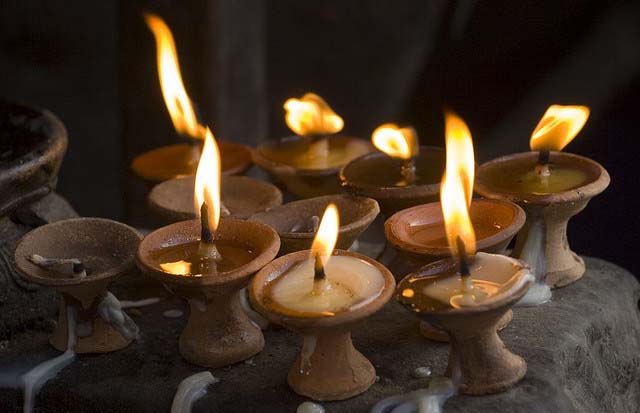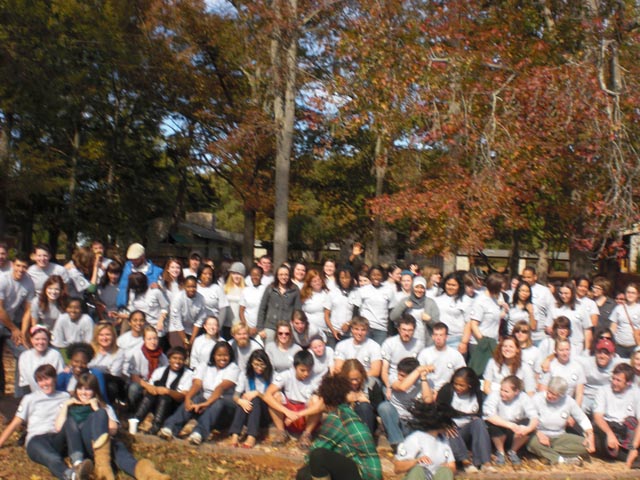
Hindu American Seva Charities – Service & Society
In the spirit of preserving our Vedic Hindu and Dharmic traditions and cultural heritage, the Indian American community has made strides in addressing various religious and cultural needs through temples, regional associations and on campus, a needed first step in the adaptation process. At first we worked towards transplanting our culture and religion to our adopted land. Now as we, the New Americans, mature and root ourselves further in the sacred and secular landscape of America, we see a need to build national and local organizations focusing on serving — with Seva Bhava — contemporary needs of our growing community and the community at large.
Seva or service is an integral part of our culture and traditions, an inside-out approach to life. Many individuals and organizations volunteer and serve in soup kitchens, shelters, health camps, and disaster relief. But few Dharmic – Hindu, Jain,Sikh, Buddhist – institutions have the capacity to provide sustained social services and do seva as is prevalent in other faith based institutions in America. We need a sustainable Dharmic social responsibility platform which will define and brand our eastern faith-based identity.
Our community, like most new immigrants, should understand that, in America, faith- based organizations play a significant role in policy development at national and local levels. Community development on the ground is greatly influenced by the faith based institutions, such as the Catholic Charities, Lutheran Services, and Jewish Community Service organizations. They carry out the government’s social service agenda supported by grants and philanthropic donations from their communities, especially from the business community.
New Americans and Seva
As new Americans, we should follow the good examples set by faith-based service organizations. However, with our Indian /South Asian cultural and philanthropy orientation, we have not as yet developed the capacity to serve in an American context. The Hindu American Seva Charities – HASC – is trying to raise this awareness within the community, especially the business and corporate community, professional groups, and college students.
For example, we are working exclusively with Oxford Research Center for Hindu Studies on the Bhumi Seva Initiative to encourage and work with and make the temples green, as part of the recommendations our Advisory Council issued to President Obama. We have already brought an awareness of our issues, our strengths and gaps, to the President and senior administration officials. In fact, HASC was formed in 2009, under the guidance of the White House, to fill this gap.
Indian Americans of all faiths are seen as a successful “model minority” which masks addressing many problematic issues within our community. Also, our success has created some envy in some quarters. Envy can cause a negative backlash (such as the Dotbusters youth gang in Jersey City in 1980’s, the exodus of Indians from Africa during Idi Amin’s regime or backlash against Jews in some countries in Europe). For most Hindus, seva is an important part of our sadhana, our spiritual practice. Seva is also a bridge builder with local communities enhancing our collective profile positively in many arenas and helping us and our future generations to live in an environment of sustained communal harmony and thus feeling comfortable with their “faith” identities and “brown” skins.

Mainstreaming the Community through Seva
The community has tremendous skills and has the potential to strengthen all communities in America by expanding philanthropy and community service orientation. Seva can mainstream the community through our faith based institutions. This is an opportunity for us to leverage our collective talents and resources, innovate, and become visible by mainstreaming Hindu Seva. This is laying a foundation for a moderate Hindu American voice which will provide public support and acceptance for our future generations. Service, especially yoga, is a bridge builder with the community at large; it increases acceptance of the New Americans, promotes peace of mind and harmony and reduces potential conflicts with the communities in which we reside. More than ever, the service mindset, the sharing of resources is important now, at a time when anti-immigrant rhetoric is increasing.
A transformation within our community’s temples and non-profits is needed to bring us on par with other established traditions and at the government policy levels as we, the New Americans, integrate in the communities in which we reside and provide needed services. We need to develop an integrated faith-based approach to service.
Transformation at the grass-roots level requires a mental paradigm shift to bring access to the services our communities need in contemporary America and to articulate our concerns at all levels of government. To really bring about a change, we need public recognition and acknowledgement of our issues, our infrastructure gaps and the need to address them effectively. By developing our own local Seva organizations on campus, within the temples and other faith based institutions, we will be empowered to address our issues through our faith based practices such as yoga, and ayurveda.
A visit to the White House
To impact change and encourage new service ideas, HASC is sponsoring a widespread civic and service participation essay contest for youth and seniors. Deadline for the essays is May 30, 2011. Seventy five (75) best essay entries and winners will be invited to the Second Annual conference and the White House briefing. Selected universities, temples and best essays will be invited to be part of year long consortium to learn together and develop seva centers. The development status and results will be presented next year. Click here for the flyer
For the Young Scholars Program graduate and undergraduate students from all background are encouraged to volunteer; more specifically, students pursuing majors in public health and public policy, pre-med, education, business and finance, accounting, math, English, political science and government, international affairs and social sciences, and psychology, law and medicine.

(Anju Bhargava is the founder of Hindu American Seva Charities, a non-religious NGO formed in 2009 under the guidance of the White House Office of Faith Based and Neighborhood Partnerships and a service partner with the Corporation for National and Community Service.)
